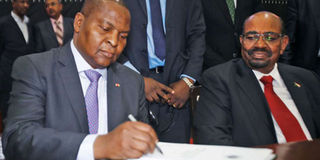Central Africa armed group says government failing to honour peace commitments

Central African President Faustin-Archange Touadera (left) signs a peace deal as Sudanese President Omar al-Bashir watches in Khartoum on February 5, 2019. AFP PHOTO
What you need to know:
- Despite elections in 2016, the country is still engulfed in regular clashes. The armed groups control about 80 percent of the CAR.
- The conflict has left thousands dead and forced a quarter of the population of 4.5 million from their homes.
One of the Central African Republic's main armed groups on Sunday accused Bangui of failing to honour "its commitments" under a peace deal signed in February by forming a new government without changes to the main ministries.
The authorities had shown "bad faith, amateurism and incompetence", Noureddine Adam, head of the Popular Front for the Renaissance of the Central African Republic (FPRC), said in a statement.
"The president (Faustin Archange Touadera) has just snuffed out the hope of the Central African people in the Khartoum peace agreement," he added.
The group's political leader said it would "not take part in this government charade", without elaborating further.
A new government was formed earlier on Sunday -- in accordance with the deal which called for an "inclusive government" -- but with all the main ministers remaining in post.
The peace deal was agreed in Sudan between the Bangui government and the 14 CAR armed groups controlling most of the territory in the strife-scarred country.
The agreement called for a series of confidence-building measures, such as establishing joint patrols and the creation of a truth and justice commission within 90 days.
The pact was the eighth since 2012 in the mineral-rich country.
CAR has been struggling to recover from the bloodletting that erupted when former president Francois Bozize, a Christian, was overthrown in 2013 by mainly Muslim Seleka rebels.
Former colonial ruler France intervened militarily under a UN mandate, pushing the Seleka from power, and a 12,000-strong UN peacekeeping mission, known as MINUSCA, was established to help restore stability.
Despite elections in 2016, the country is still engulfed in regular clashes. The armed groups control about 80 percent of the CAR.
The conflict has left thousands dead and forced a quarter of the population of 4.5 million from their homes.



